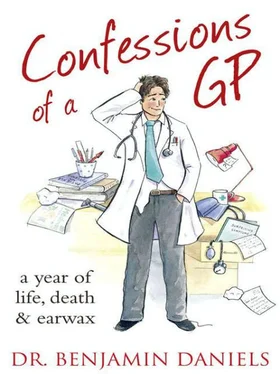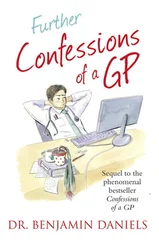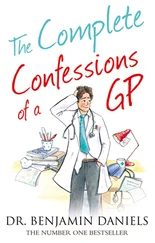Over the next hour my pager started going off increasingly frequently until it built up to what felt like a constant chorus of bleeps. Jobs that would take a few minutes for me to do now, took an hour back then because I was so new and inexperienced. I decided that the cocky doctor role didn’t suit me so I went for the pathetic vulnerable new doctor approach. It worked and the nurses soon began to feel sorry for me. They offered to make me tea, showed me the secret biscuit cupboard and helped me find my feet. Just as I was beginning to gain a little confidence, my pager made a frightening sound. Instead of the normal slow, steady bleep there was a stream of quick staccato bleeps followed by the words ‘Cardiac arrest Willow ward… Cardiac arrest Willow ward.’ To my horror, that was the ward that my consultant covered. That meant that I should really be there. I started running. The adrenaline was pumping, my white coat was sailing behind me as I zipped passed people in the corridor. I was important. It felt great! Suddenly, as I got closer to Willow ward, a terrifying thought dawned on me, ‘Oh my God. What if I’m the first doctor there!!!! I’ve only ever resuscitated a rubber dummy in training exercises. I’ve never had to do the real thing.’ To my left was the gents’ toilet. Doubts began to race through my head. ‘Perhaps I could just nip in there and hide for a bit. I can reappear in a few minutes once the cavalry has arrived.’ It was tempting, but I bravely decided to keep on running and meet my fate.
Lying in a bed was a frail old lady with her pyjamas ripped open and her torso exposed. She was grey and lifeless and I can remember her ribs protruding out of her chest wall. A couple of nurses were frantically running around looking for oxygen and the patient’s notes, while another nurse was doing chest compressions. To my relief, a remarkably relaxed-looking medical registrar was standing at the head of the bed and calmly taking charge. A monitor was set up and it was clear even to me that the wiggly lines on the screen meant that the patient needed to be shocked. A few other doctors soon turned up and I was pretty much a spectator as they expertly performed a few rounds of CPR (cardiopulmonary resuscitation) followed by a set of shocks. It was all very dramatic but the woman didn’t seem to be making any signs of a revival. Thinking that I had managed to escape my first cardiac arrest as an onlooker only, I began to consider sneaking away, aware of how many mundane jobs were waiting for me to be done on other wards. Unfortunately, the relaxed-looking registrar spotted me and called me forward. ‘This one’s not coming back; shall we let the house officer have a go with the defibrillator?’ I had just done my CPR training and it was all still clear in my mind. This was my big moment. For some reason, I had it in my head that if it was me who shocked her, she would suddenly come round. What a great story that would be, I thought as I stepped up to the bed. The one thing that the instructors had really emphasised in the resuscitation training was the importance of safety. I had to make sure that all the doctors, nurses and oxygen masks were clear of the bed before shocking the patient. I stepped up and took the paddles. Lifting them out of the machine I carefully placed them on the woman’s chest. Looking all around me, I started the drill: ‘Oxygen away, head clear, feet clear, charging to 360, shocking at 360.’
BANG. My adrenaline had been pumping but I hadn’t expected that. I had stayed on my feet but had been thrown backwards with a jolt. That never happened with the dummies. I must have been looking slightly dazed and the registrar glanced over at me with faint amusement. ‘You’ve electrocuted yourself, you prat.’ Unfortunately, he was right. I had checked closely to make sure that the bed was clear of bystanders before I gave the electric shock, but I hadn’t realised that on running to the ward, I had shoved my stethoscope into the pocket of my white coat and as I was leaning over the patient, the nicely conductive metal tubes had been lying on the patient’s left hand.
As if to rub salt in the wound, my first pathetic effort at resuscitation led the woman to go straight into asystole (flatlining) and the registrar called it a day. The correct thing to have done would have been to report my electrocution as a critical incident and give me a bit of a check-over, but instead the registrar just disappeared off the ward chuckling to himself. I had made his night and he called me ‘Sparky’ for the rest of my six-month spell at the hospital. I was left to carry on with the boring jobs on the ward and by the following morning everyone had heard of my disastrous first night. Perhaps it was an early indicator that I was better suited to the slightly less dramatic world of general practice.
At my secondary school I was known as Benny Big Nose. Not the most charming of nicknames, but nevertheless a beautifully simple and succinct summary of my name and most prominent facial feature. I sometimes wish medicine could be as straightforward. Why do we use long-winded medical jargon to describe something rather simple?
Purulent nasal discharge – snot; viral upper respiratory tract infection – a cold; infective gastroenteritis – the shits; strong urinary odour – stinks of piss.
One reason for medical jargon is so that we doctors can write something in the notes that if the patient were to read, they wouldn’t take offence and complain. There was a time a few years back when patients had no right at all to see their own medical notes. I was recently looking through the old paper notes of one retired farmer and the sole entry for 1973 was ‘Patient smells of pig shit.’ How beautifully jargon free.
When I first qualified, I loved all the medical jargon. I felt that it made us sound clever and elite and I got off on the fact that I could have a chat with a fellow medic on the train. However, it only takes an interaction with someone who uses jargon that you don’t understand to realise how annoying it can be. Current letters from our managers at the PCT (Primary Care Trust) have just this effect on me. What do phrases like ‘performance-based target strategies’ and ‘competence managed commissioning’ mean. They certainly don’t seem to bear any relevance to my daily routine of listening to people’s health grumbles and trying to make them feel a bit better.
Patients are always happiest if you skip the jargon and say it how it is. I find that replacing the phrase ‘stage-four renal impairment’ with ‘knackered kidneys’ or ‘mitotic growth’ with ‘cancer’ is generally appreciated. We all like to have things explained in terms we can understand and I just wish that NHS managers would write me letters in a language that I could comprehend.
It was Darren Mills who first named me Benny Big Nose. The last I heard, he was spending some well-deserved time at Her Majesty’s pleasure. His straightforward and direct manner seemed to get him in trouble from the teachers and later the police. However, Darren, if you’re out there, I’d like to say thank you for teaching me the valuable lesson of saying it how it is. You usually don’t cause as much offence as you think you might and most people will appreciate your honesty.
Proud to work for the NHS
One weekend I was doing a locum shift in A&E and saw a middle-aged German couple who had been involved in a car accident. They had been on a driving holiday around the UK and had crashed their car into a ditch. Fortunately, they weren’t severely hurt but an ambulance was with them within ten minutes and the paramedics gave some basic first aid before ferrying them to hospital. They were then seen by me and I organised some X-rays to make sure that the man didn’t have any neck injuries and to confirm a suspected dislocation of one of the woman’s fingers. The man’s neck X-ray was fine and I injected some local anaesthetic into the woman’s finger and popped the dislocated joint back into place. The healthcare assistant got them a cup of tea and a sandwich each and one of the nurses then cleaned and dressed a few of their cuts and scratches. Finally, the receptionist let them use her phone to call their car hire firm and organise a taxi back to their hotel.
Читать дальше
Конец ознакомительного отрывка
Купить книгу











![Benjamin Franklin - Memoirs of Benjamin Franklin; Written by Himself. [Vol. 2 of 2]](/books/747975/benjamin-franklin-memoirs-of-benjamin-franklin-wr-thumb.webp)
![Benjamin Franklin - Memoirs of Benjamin Franklin; Written by Himself. [Vol. 1 of 2]](/books/748053/benjamin-franklin-memoirs-of-benjamin-franklin-wr-thumb.webp)